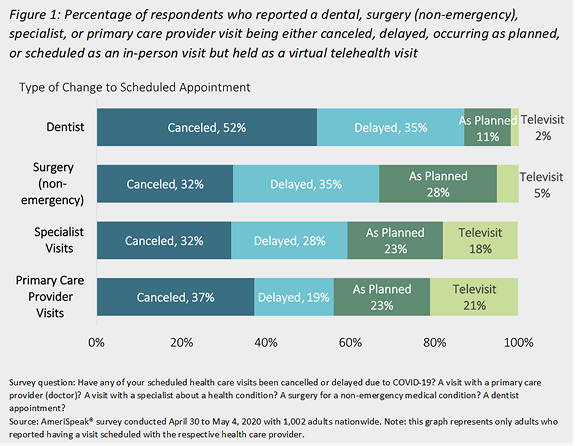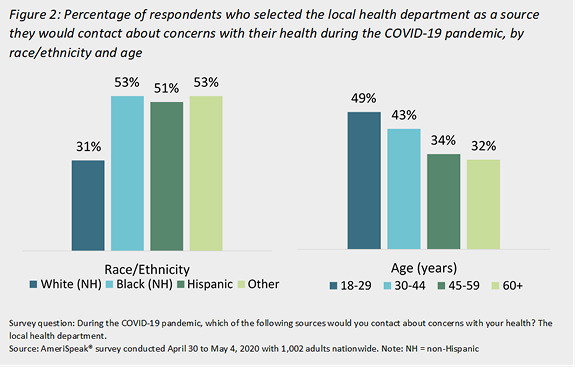Pandemic Unveils Challenges in Access to Health Care and Trusted Sources of Information
CHICAGO, June 25, 2020 — On March 18, 2020, the Centers for Medicare & Medicaid Services released recommendations to health care providers to delay nonessential medical, surgical, and dental procedures during the COVID-19 pandemic. A new AmeriSpeak® survey from NORC at the University of Chicago’s Medicaid Managed Care Organization Learning Hub measured the impact these guidelines had on scheduled appointments across the nation.
Respondents were asked if any of their scheduled primary care, specialty care, surgeries, or dentist visits have been canceled, delayed, conducted as a televisit, or occurred as planned during the pandemic. The survey found that at least two thirds of these appointments were either canceled, delayed, or conducted as a televisit.
Dentist visits were reported to be canceled the most (52 percent), followed by visits for primary care (37 percent), non-emergent surgery (32 percent), and specialty care (32 percent).


Have any of your scheduled health care visits been cancelled or delated due to COVID-19?


During the COVID-19 pandemic, which of the following sources would you contact about concerns with your health? The local health department.
Of the respondents with a health care visit scheduled, virtual telehealth visits were commonly held in place of an in-person visit for primary care (21 percent) and specialty care (18 percent) visits.
In addition to delays in care, another pressing concern during the pandemic is access to trusted sources of information on health care. The survey asked the general public to indicate whether they would contact a number of sources about concerns for their health during the COVID-19 pandemic, one of which was their local health department. The survey found that respondents from communities of color were significantly more likely to contact their local health department than were white respondents.
Over half of respondents from communities of color selected the local health department as a source of health information they would contact about concerns for their health during the pandemic, while one-third of white respondents made this selection.
The need for reliable and trusted health information is needed more than ever during a pandemic,” said Scott Leitz, senior fellow at NORC. “Differences in trust for various areas of the health care system have long been studied as a means to better understand outreach approach, utilization patterns, and overall quality of care provided to the community.”
Furthermore, the survey found that respondents younger in age were more likely to select the local health department as a source of health information compared to older adults. Nearly half (49 percent) of respondents age 18 to 29 years selected the local health department as a source to contact with concerns for their health, compared to roughly one-third of respondents over the age of 45 years.
Methodology
The poll, funded by the Robert Wood Johnson Foundation as part of NORC’s Medicaid Managed Care Organization Learning Hub was conducted between April 30 and May 4, 2020, during a monthly Omnibus survey. It included 1,002 interviews with a nationally representative sample (margin of error +/- 4.24 percent) of adult Americans age 18+ using the AmeriSpeak® Panel. AmeriSpeak is NORC’s probability-based panel designed to be representative of the U.S. household population.
About NORC’s Medicaid Managed Care Organization (MCO) Learning Hub
The NORC Medicaid MCO Learning Hub offers reliable and timely resources, as well as opportunities for Medicaid MCO and other stakeholders to convene and share ideas about short- and long-term strategies that can close longstanding and growing health gaps among groups who lack what they require to live their healthiest lives. NORC and its partners—Speire Healthcare Strategies, America’s Health Insurance Plans, the Association for Community Affiliated Plans, Community Catalyst, and Families USA—are working together on this project to support MCOs in their efforts to establish a more integrated approach to meeting the needs of their members through the MCO Learning Hub.
About NORC at the University of Chicago
NORC at the University of Chicago conducts research and analysis that decision-makers trust. As a nonpartisan research organization and a pioneer in measuring and understanding the world, we have studied almost every aspect of the human experience and every major news event for more than eight decades. Today, we partner with government, corporate, and nonprofit clients around the world to provide the objectivity and expertise necessary to inform the critical decisions facing society.
Contact: For more information, please contact Eric Young at NORC at young-eric@norc.org or (703) 217-6814 (cell).





